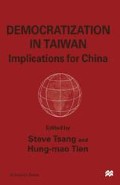Abstract
Riding on what Samuel Huntington has called the ‘third wave’ of democratization, Taiwan has undergone a major transformation which has resulted in changes in state—society relations, shifts in state policy, and new constitutional and other institutional arrangements. It has also altered the nature and formation of civil society.
Access this chapter
Tax calculation will be finalised at checkout
Purchases are for personal use only
Preview
Unable to display preview. Download preview PDF.
Notes
Amos Perlmutter, Modern Authoritarianism (New Haven, CT: Yale University Press, 1981).
See Yangsun Chou and Andrew J. Nathan, ‘Democratizing Transition in Taiwan’, Asian Survey (1987) vol. 27, no. 3, 277–99;
Hung-mao Tien, The Great Transition: Political and Social Change in the Republic of China (Stanford, CA: Hoover Institution Press, 1989).
H.H. Michael Hsiao, ‘The Rise of Social Movements and Civil Protests’, in Tun-jen Cheng and Stephan Haggard (eds), Political Change in Taiwan (Boulder, CO: Lynne Rienner, 1992), 57–72.
Guillermo O’Donnell and Philippe C. Schmitter, Transitions from Authoritarian Rule: Tentative Conclusions about Uncertain Democracies (Baltimore, MD: Johns Hopkins University Press, 1986).
Kai Ma, et al., Where to Go the Taiwan Economy? (Taiwan Ching Chi He Chu Chu) (in Chinese) (Taipei: the Excellence Publisher, 1990).
H.H. Michael Hsiao, et al., Monopoly and Exploitation: The Political Economy of Authoritarianism (Kuo Chia Cheng Tse Yu Pi Pan Te Kung Kung Lun Shu) (in Chinese) (Taipei: Taiwan Study Foundation, 1989).
Chung-Hsin Chen, State Policy and Critical Public Discourse (in Chinese) (Taipei: The Institute for National Policy Research, 1989).
Jean L. Cohen and Andrew Arato, Civil Society and Political Theory (Cambridge, MA: The MIT Press, 1992), ix.
Thomas B. Gold, State and Society in the Taiwan Miracle (Armonk, NY: M.E. Sharpe, 1986).
Ming-tong Chen, ‘Local Factions and Elections in Taiwan’s Democratization’, in Hung-mao Tien (ed.), Taiwan’s Electoral Politics and Democratic Transition (Armonk, NY: M.E. Sharpe, 1996), 174–92.
Yun-han Chu, Crafting Democracy in Taiwan (Taipei: The Institutute for National Policy Research, 1992), 105.
Mau-kei Chang, Social Movements and Political Transformation (She Hui Yun Tung Yu Cheng Chih Chuan Hua) (in Chinese) (Taipei: The Institute for National Policy Research, 1989).
Eugenia Yun, ‘Religious Renaissance’, Free China Review, vol. 44 (1994), no. 12, 4–23.
Editor information
Editors and Affiliations
Copyright information
© 1999 Palgrave Macmillan, a division of Macmillan Publishers Limited
About this chapter
Cite this chapter
Chyuan-jenq, S. (1999). Civil Society and Democratization. In: Tsang, S., Hung-mao, T. (eds) Democratization in Taiwan. St Antony’s. Palgrave Macmillan, London. https://doi.org/10.1007/978-1-349-27279-2_6
Download citation
DOI: https://doi.org/10.1007/978-1-349-27279-2_6
Publisher Name: Palgrave Macmillan, London
Print ISBN: 978-0-333-76357-5
Online ISBN: 978-1-349-27279-2
eBook Packages: Palgrave Political & Intern. Studies CollectionPolitical Science and International Studies (R0)

